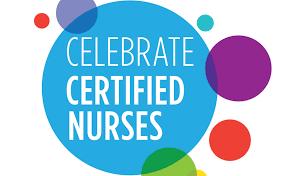The annual recognition of Certified Nurses Day on March 19 honors the nurses who go the extra step to achieve certification in their specialties. But the day also helps raise awareness in the nursing community about the importance of certification and the benefits it brings to a nursing career.
Certification is an excellent career advancing move; after all gaining more knowledge and skills in your nursing specialty is only going to help you be a better nurse. But many nurses overlook another important result of gaining certification–the confidence boost it gives you and the new peer recognition of your advanced knowledge.
Clara Beaver, MSN, RN, ACNS-BC, AOCNS, and president of the Oncology Nursing Certification Corporation (ONCC) says certification brings better patient care, but also changes a nurses relationship with patients. “The best part [of nursing] is the buildup of trust with patients,” she says, “and having certification shows you have that commitment to oncology and that you have that knowledge. You both care about it and you know about it.”
Each certification is different, so look into one that that matches your specialty area. For example, ONCC offers five certifications: Oncology Certified Nurse, Certified Pediatric Hematology/Oncology Nurse, Certified Breast Care Nurse, Blood and Marrow Transplant Certified Nurse, and Advanced Oncology Certified Nurse Practitioner. Beaver says the bone marrow and breast care certifications are newer and were industry driven as a result of many nurses specializing in oncology subspecialties.
Some nursing specialties are starting to require certification as the advanced and most current skills are required for patient care. Many Magnet hospitals require certification for some nurses as do many cancer centers.
“We’re always trying to find the value in increasing knowledge and commitment,” says Beaver. “Certification says to the community that those nurses are staying up-to-date on what’s going on and their skills may be higher.” Beaver says when she became certified it made her think about patient care differently. “I looked at my patient differently because I had increased knowledge,” she says. :I looked at the entire background and not just at the task in front of me.” With certification, Beaver says she understood more of how things worked and could explain what was going on to the patient a little more.
Nurses who are certified are proud to show their certification, says Beaver, because it is instant recognition that you’ve gone above and beyond what’s required. “I feel like certification takes you up a little higher and they become like the informal leaders. They have raised confidence.” And their success with becoming certified shows other nurses that they can also achieve the same thing.
Nurses do find one of the biggest roadblocks to certification is test anxiety. “Nothing is as bad as the NCLEX,” says Beaver with a laugh. Before each of her three certification exams, Beaver says she had to overcome major test anxiety, so she understands why it can be a deterrent. “I just had to remember this is what I do every day,” she says. “Test taking is scary.”
Before each exam, she studied the test blueprints. She also pulled all the resources that were referenced to study those as well. That’s what the questions are based on, she says, so review all that information carefully. “Pull the statistics and the references,” she says and find out your weakest areas so you can focus on those places intensely. Reading information out loud helped Beaver retain the information, and she encourages nurses to find a method that works best for them.
When you sit for the test, Beaver suggests that you read the entire question, then read all the answers, and then go back and read the question over again. This will help you slow down and comprehend exactly what is being asked.
If paying for the exam is a barrier, see if your organization will help pay for it or if a professional organization will help.
“Certification is an important part of our job as nurses,” Beaver says. “And it’s attainable. It expands your knowledge base and your skill set. And it shows a commitment to what you are doing.”
- WOC Nurses Week Highlights Specialty - April 16, 2024
- Honoring Radiology Nurses Day on April 12 - April 12, 2024
- Travel Offers New Career Possibilities - April 8, 2024



